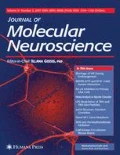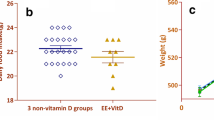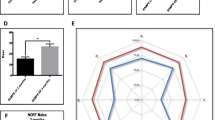Abstract
For decades, the ketogenic diet has been an effective treatment of intractable epilepsy in children. Childhood epilepsy is pharmacoresistant in 25–40 % of patients taking the current prescribed medications. Chronic seizure activity has been linked to deficits in cognitive function and behavioral problems which negatively affect the learning abilities of the child. Recent studies suggest the ketogenic diet (KD), a high fat with low carbohydrate and protein diet, has adverse effects on cognition in weanling rats. The diet reduces circulating glucose levels to where energy metabolism is converted from glycolysis to burning fat and generating ketone bodies which has been suggested as a highly efficient source of energy for the brain. In contrast, when weanling rats are placed in an enriched environment, they exhibit increased spatial learning, memory, and neurogenesis. Thus, this study was done to determine if weanling rats being administered a KD in an environmental enrichment (EE) would still exhibit the negative cognitive effects of the diet previously observed. The present study suggests that an altered environment is capable of reducing the cognitive deficits in weanling rats administered a KD. Learning was improved with an EE. The effect of diet and environment on anxiety and depression suggests a significant reduction in anxiety with enrichment rearing. Interestingly, circulating energy substrate levels were increased in the EE groups along with brain-derived neurotrophic factor despite the least changes in weight gain. In light of numerous studies using KDs that seemingly have adverse effects on cognition, KD-induced reductions in excitotoxic events would not necessarily eliminate that negative aspect of seizures.







Similar content being viewed by others
References
Angelucci F, DeBartolo P, Gelfo F, et al. (2009) Increased concentrations of nerve growth factor and brain-derived neurotrophic factor in the rat cerebellum after exposure to environmental enrichment. Cerebellum. 8:499–506
Baumans V (2005) Environmental enrichment for laboratory rodents and rabbits: requirements of rodents, rabbits and research. Inst Lab Res J 46(2):162–170
Behassan NA, Jan MM (2006) Ketogenic diet update and application. Neurosci (Riyadah) 11:235–240
Bexandale S, Heaney D, Thompson PJ, Duncan JS (2010) Cognitive consequences of childhood-onset temporal lobe epilepsy across adult lifespan. Neurology 75:705–711
Brenes J, Padilla M, Fornaguera J (2009) A detailed analysis of open-field habituation and behavioral and neurochemical antidepressant-like effects in postweaning enriched rats. Behav Brain Res 197:125–137
Boison D, Masino SA, Geiger JD (2011) Homeostatic network regulation-a novel concept to avoid pharmacoresistance in epilepsy. Expert Opin Drug Discovery 7:713–724
Brodie MJ, Barry SJ, Bamagous GA, Norrie JD, Kwan P (2012) Patterns of treatment response in newly diagnosed epilepsy. Neurology 78:1548–1554
Cross JH (2009) Ketogenic diet in the management of childhood epilepsy. Indian Pediatr 46:663–664
Diamond MC (2001) Response of the brain to enrichment. An Acad Bras Cienc 73:211–220
Duman CH, Schlesinger L, Russell DS, Duman RS (2008) Voluntary exercise produces antidepressant and anxiolytic behavioral effects in mice. Brain Res 1199:148–158
Faverjon S, Silveira DC, Fu DD, et al. (2002) Beneficial effects of EE following status epilepticus in immature rats. Neurology 59:1356–1364
Gao X, Wee AS, Nick TG (2005) Effect of Keto-acidosis on seizure occurrence in diabetic patients. J Miss State Med Assoc 46:131–133
Garriga-Canut M, Schoenike B, Qazi R, et al. (2006) 2-Deoxy-D-glucose reduces epilepsy progression by NRSF-CtBP-dependent metabolic regulation of chromatin structure. Nat Neurosci 9:1382–1387
Gasior M, Yankura J, Hartman AL, French A, Rogawski MA (2010) Anticonvulsant and proconvulsant actions of 2-deoxy-D-glucose. Epilepsia 51:1385–1394
Graziano AL, Petrosini A, Bartoletti (2003) Automatic recognition of explorative strategies in the Morris water maze. J Neurosci 130:33–44
Hackman D, Farah M, Meaney MJ (2010) Socioeconomic status and the brain: mechanistic insight from human and animal research. Nat Rev Neurosci 11:651–659
Hartman AL, Gasior M, Vining EP, Rogawski MA (2007) The neuropharmacology of the ketogenic diet. Pediatric Neurol 36:281–292
Hendriksen H, Prins J, Olivier B, Oosting RS (2010) Environmental enrichment induces behavioral recovery and enhanced hippocampal cell proliferation in an antidepressant-resistant animal model for PTSD. PLoS One 5:e11943
Hori A, Tandon P, Holmes GL, Stafstorm CE (1997) The ketogenic diet: effect on expression kindled seizures and behavior in adult rats. Epilepsia 38:750–758
Ickes BR, Pham TR, Sanders LA, et al. (2000) Long-term environmental enrichment leads to regional increase in neurotrophin levels in rat brain. Exp Neurol 164:45–52
Iorio R, Assenza G, Tombini M (2014) The deletion of neural autoantibodies in patients with anti-epileptic-drug-resistant epilepsy predicts response to immunotherapy. Eur J Neurol 22:70–78
Kendler KS (1996) Major depression and generalized anxiety disorder: same genes (partly) different enviorments-revisited. Br J Psych 30:68–75
Kernie SG, Liebl DJ, Parada LF (2000) BDNF regulates behavior and locomotor activity in mice. EMBO 6:1290–1300
Lambrechts DA, Bovens MJ, de la Parra NM, et al. (2013) Ketogenic diet effects on cognition, mood, and psychosocial adjustment in children. Acta Neurol Scand 127:103–108
Lapiz MD, Fulford A, Muchimapura S, Mason R, Parker T, Marsden CA (2003) Influnce of postweaning on social isolation in the rat on brain development, conditioned behavior and neurotransmission. Neurosci Behav Physiol 33:13–29
Lefevre F, Aronson N (2000) Ketogenic diet for the treatment of refractory epilepsy in children: a systematic review of efficacy. Pediatrics 4:E46
Levine JB, Leeder AD, Parekkadean B (2008) Isolation rearing impairs wound healing and is associated with increased locomotion and decreased immediate early gene expression in medial prefrontal cortex of juvenile rats. Neuroscience 151:589–603
Lewis MH (2004) Environmental complexity and central nervous system development and function. Ment Retard Dev Disabil Res Rev 10:91–95
Lyczowski DA, Pfeifer HH, Ghosh S, Thiele EA (2005) Safety and tolerability of the ketogenic diet in pediatric epilepsy: effects of valproate therapy. Epilepsia 46:1533–1538
Moncek F, Duncko R, Johansson BB, Jezova D (2004) Effect of environment on stress related systems in rats. J Neuroendocrinol 16:423–431
Morris R (1984) Developments of a water-maze procedure for studying spatial learning in the rat. J Neurosci Methods 11:47–60
Murphy PS, Likehodii SS, Nylen K, Burnham MW (2004) The antidepressant properties of the ketogenic diet. Biol Psychiatry 56:981–983
Murphy PS, Likehodii SS, Hatamian M, Burnham WM (2005) Effect of the ketogenic diet on the activity level of wistar rats. Pediatr Res 57:353–357
Neal EG, Chaffe H, Schwartz RH, et al. (2008) The ketogenic diet for the treatment of childhood epilepsy: a randomized controlled trial. Lancet Neurol 7:500–506
NRC (National Research Council) (1996) Guide to care and use of laboratory animals. National Academy Press.
Pellow S, Chopin P, File SE, Briley M (1985) Validation of open:closed arm entries in an elevated plus-maze as a measure of anxiety in the rat. J Neurosci Methods 14:149–167
Porsolt RD, Anton G, Blavet N, Jalfre M (1978) Depression: a new animal model sensitive to antidepressant treatments. Eur J Pharmacol 47:379–391
Pulsifer MB, Gordon JM, Brandt J, Vining EP, Freeman JM (2001) Effects of the ketogenic diet on development and behavior: preliminary report of a prospective study. Dev Med Child Neurol 43:301–306
Rios M, Fan G, Fekete C (2001) Conditional depletion of brain-derived neurotrophic factor in the postnatal brain leads to obesity and hyperactivity. Mol Endocrin Soc 15:1748–1757
Simpson JJ, Kelly JP (2011) The impact of environmental enrichment in laboratory rats-Behavioural and neurochemical aspects. Behav Brain Res 222:246–264
Snead CO (2004) The ketogenic diet: a cautionary note. Pediatr Res 55:368–369
Su SW, Cilio MR, Sogawa Y, Silveira DC, Holmes GL, Stafstrom CE (2000) Timing of ketogenic diet initiation in an experimental epilepsy model. Dev Brain Res 125:131–138
Suo C, Lu X, Fang K, et al. (2013) Efficacy and safety of the ketogenic diet in Chinese children. Seizure 3:174–178
Unger TJ, Calderon GA, Bradley LC, Sena-Esteves M, Rios M (2007) Selective deletion of BDNF in the ventromedial and dorsomedial hypothalamus of adult mice results in hyperphagic behavior and obesity. J Neurosci 27:14265–14274
Van Vliet EA, Aronica E, Gorter JA (2014) Role of blood-brain barrier in temporal lobe epilepsy and pharmacoresistance. Neuroscience 277:455–473
Varvel N. H., Jiang J., Dingledine R. (2014) Candidate drug targets for prevention or modification of epilepsy. Annu Rev Pharmacol Toxicol. 25, Epub
Vasconcelos MM, Azevedo PM, Esteves L, Brito AR, Olivaes MC, Herdy GV (2004) Ketogenic diet for intractable epilepsy in children and adolescents: [report of six cases]. Rev Med Bras 50:380–385
Vizuette AF, de Souza DF, Guerra MC, Batassini C, Dutra MF, Bernardi C, Costa AP, Concalves CA (2013) Brain changes in BDNF and 100B induced by ketogenic diets in wistar rats. Life Sci 92:921–928
Wang C, Billington CJ, Levine AS, Kotz CM (2010) Brain-derived neurotrophic factor (BDNF) in the hypothalamic ventromedial nucleus increases energy expenditure. Brain Res 8:66–77
White S (2003) Preclinical development of antiepileptic drugs: past, present, and future directions. Epilepsia 44:2–8
Winocur G, Greenwood C (1996) Cognitive impairment in rats fed high-fat diets: a specific effect of saturated fatty-acid intake. Behav Neurosci 110:451–459
Winocur G, Greenwood C (1999) The effects of high fat diets and environmental influences on cognitive performance in rats. Behav Brain Res 101:153–161
Xu B, Goulding EH, Zang K (2003) Nat Neurosci 6:736–742
Zhao Q, Stafstrom CE, Fu DD, Hu Y, Holmes GL (2004) Detrimental effects of the ketogenic diet on cognitive functions in rats. Pediatr Res 55:498–506
Ziegler DR, Gamaro GD, Araujo E, Bassani MG, Perry ML, Dalmaz C, Concalves CA (2005) Nociception and locomotor activity are increased in ketogenic diet fed rats. Physiol Behav 84:421–427
Author information
Authors and Affiliations
Corresponding author
Rights and permissions
About this article
Cite this article
Scichilone, J.M., Yarraguntla, K., Charalambides, A. et al. Environmental Enrichment Mitigates Detrimental Cognitive Effects of Ketogenic Diet in Weanling Rats. J Mol Neurosci 60, 1–9 (2016). https://doi.org/10.1007/s12031-016-0753-4
Received:
Accepted:
Published:
Issue Date:
DOI: https://doi.org/10.1007/s12031-016-0753-4




